In the dynamic construction environment of the UAE, safety, efficiency, and compliance are non-negotiable. Whether it’s a skyscraper in Dubai or an industrial plant in Abu Dhabi, scaffolding and temporary work platforms play a critical role in supporting elevated work safely and effectively.

These temporary structures are essential for providing access, support, and fall protection in construction, maintenance, inspection, and facade work. Professional scaffolding services in the UAE ensure that all systems comply with Dubai Municipality, Abu Dhabi Municipality, and recognized international safety standards.
Purpose of Third-Party Inspection
In the UAE, third-party inspection of scaffolding and temporary work platforms is a mandatory and critical process to ensure:
- Safety of personnel working at height
- Compliance with UAE regulations and international standards
- Reliability of structural integrity and load-bearing capacity
- Legal protection for contractors and site owners
What Does the Inspection Cover?
A certified third-party inspection agency will assess:
Structural Integrity
- Proper assembly of standards, ledgers, transoms, braces, toe boards, guardrails, etc.
- Base plates, sole boards, and anchorage
- Platform decking and access ladders
Dimensional & Load Compliance
- Verification of platform width, height-to-base ratio
- Load rating for workers, tools, and materials
- Scaffolding layout and bracing pattern
Safety Features
- Fall protection systems (guardrails, midrails)
- Tagging system (Green/Yellow/Red tags)
- Access and egress provisions (safe ladders or stairs)
Documentation Review
- Scaffolding design drawing (if applicable)
- Risk assessments & method statements (RAMS)
- Scaffold register and inspection logs
Relevant Codes and Standards
Third-party inspections in the UAE are performed as per:
- EN 12811-1 (Temporary works equipment – Scaffolds – Performance requirements)
- BS 5975 (Code of practice for temporary works)
- OSHA standards (for international firms)
- UAE Civil Defense and Municipality Regulations
- Site-specific HSE requirements (e.g., ADNOC, DEWA, EMAAR, etc.)
Certification and Reporting
After inspection, the third-party agency provides:
- Inspection Report (highlighting pass/fail status and non-compliance observations)
- Compliance Certificate (valid for limited duration, often 7 to 30 days)
- Tagging Approval (Green tag for safe to use, Red for unsafe)
Why Is It Mandatory?
- Legal Requirement: Inspections are enforced by Dubai Municipality, Abu Dhabi Municipality, ADOSH, and other Emirates’ regulatory bodies.
- Insurance Compliance: Many insurers require valid third-party certification for scaffold-related coverage.
- Contractor Accountability: Protects main contractors and clients from liabilities due to falls or collapses.
Why Choose Us?
ADM, ENAS & ISO-Certified Scaffolders
We employ a trained team approved by regulatory bodies with full PPE, toolbox talks, and risk assessments.
Third-Party Scaffold Inspection and Tagging
We offer weekly certified inspections with tagging reports for compliance with ADM and HSE standards.
Conclusion
Third-party inspection of scaffolding and temporary work platforms in the UAE is non-negotiable for any site where work at height is performed. It’s a vital part of safe construction practice and regulatory compliance. Regular inspections, documentation, and safety certifications ensure risk-free operation, worker protection, and project continuity.
FAQ‘s Scaffolding & Temporary Platform
Can you provide scaffolding design drawings for approval?
Absolutely. Our engineers provide complete scaffold layout and PE-stamped drawings for approvals.
